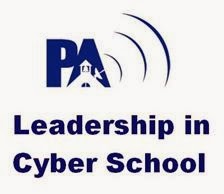Another View: Defending cyber charter schools
By Dr. James Hanak
Posted: 02/26/15, 7:57 PM EST
Dr. Hanak is a mentor, friend and colleague of mine at Pennsylvania Leadership Charter School. :)
For years, Pennsylvania’s cyber
charter schools have been criticized for under-performing on the state’s
standardized tests (PSSAs). This is in part because cyber charter schools
attract many students from struggling school districts that have failed to give
these students a proper education.
So, this month, on their website,
the PA Department of Education released the statewide SAT scores for 653
Pennsylvania high schools/charter high schools. Of the 189 charter schools in
the state, three of the top six charter schools were cyber charter Schools.
The top charter school was 21st
Century Cyber Charter School in 63rd place with the next charter school placing
at number 116! This happened even though there are only 14 cyber charter
schools among the 189 statewide PA charter schools.
The most amazing part of this report
is that all top eight charter schools accomplished their scores with 27 percent
less money than their traditional counterparts!
So, what do cyber charter schools
get as a reward?
Currently in Harrisburg, the House
of Representatives is considering a bill, sponsored by Rep. Mike Reese, (HB
530) that, if passed by the Senate and signed by the governor, would cut
funding for cyber charter schools by more than 5 percent across the board and
by as much as 8 percent for students from Philadelphia and as much as 15
percent from students from Chester.
The biggest problem with this bill
is that it does not address the other inequities in the cyber charter school
funding formula that punish the schools. All charter schools begin with only 75
cents on the dollar from the home sending school district. Along with this,
charter schools are held to higher standards than traditional counterparts and
cyber charter schools are graded with more stringent requirements than their
equal brick-and-mortar counterparts.
The PA Association of School
Business Officials, (PASBO.org) is the prime mover of this bill and has only
one agenda. All the members of the PASBO board are top administrators in local
school districts. They see students leaving their districts and taking tax
dollars with them to the only charter schools that reach statewide – cyber
charter schools. PASBO must do whatever it can to stop cyber charter schools
from being successful. Forget the needs of the students. It is the needs of the
budget that are paramount.
Unfortunately, money talks and the
little guy often gets crushed. Cyber schools were cut before because they were
not making the grade. Now that they are successful, they most certainly must be
cut. The education monopoly establishment must never allow a better innovative
idea to catch hold. After all, it might force everyone else to rethink how they
are delivering education.
Cyber schools are utilizing
tomorrow’s technology: iPads, video conferencing, multiple screens, touch
screens, smart boards, interactive technology, educational gaming, avatars,
MOODLE open source learning environments. Cyber schools can create virtual
classrooms that pull students together from across the state and across
cultural divides. Cyber schools provide state-of-the-art computers, a
high-speed Internet and a full educational experience to all their students. A
cyber school can provide a high school student any course he or she would ever
want to take in a high school setting – including AP and honors courses and
increasingly, university level courses.
This is why the education
establishment must at all costs cut the funding to these already underfunded
schools. The establishment fears the charter school movement, if left unfettered,
will, in a couple of generations, take over as it already has in Washington,
D.C. where now over 60 percent of the students attend a charter school.
If this bill passes, who are the
winners? The well-paid administrators who won’t have to give up their perks and
benefits. Who will lose? The thousands of students that are stuck in schools
from which they cannot escape. Reported in “Chalk and Talk” ... written by
Philadelphia public school teachers, in the Philadelphia Schools: 2005-2010
there were 19,752 assaults. During that same time there were zero assaults in
all the cyber charter schools combined. Safe education with high SAT scores.
Hard combo to beat.
Dr. James Hanak is CEO of the PA
Leadership Charter School.



